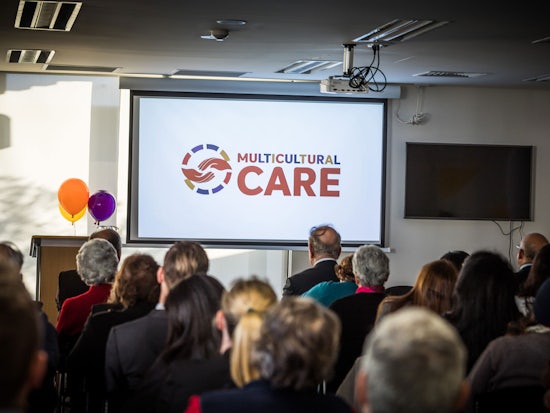Providing multicultural care for all
Reflecting its objectives of providing culturally-tailored care to everyone in the multicultural community, not just those who are older, Multicultural Aged Care has unveiled its new brand.

Multicultural Care’s new branding is designed to reflect the organisation is inclusive, regardless of cultural background (Source: Ben Williams Photography)
Now known as Multicultural Care, the organisation has been meeting the needs of the multicultural communities from over 40 different language groups across the Inner West, South West and South East Sydney regions for over two decades.
As a registered NDIS provider, it will also help families of multicultural people with a disability who are finding language barriers an issue when trying to navigate NDIS services. In addition, it will provide bilingual care workers to help integrate cultural values and practises into care plans.
“Becoming ‘Multicultural Care’ means we can continue to meet the aged care needs of multicultural communities in inner west, south west and south east Sydney, but also fill the gap being left by the lack of culturally-tailored disability care,” says Dr Rosy Walia, Chief Executive Officer, Multicultural Care. “This rebranding was crucial to ensuring local people with a disability felt we could meet their care needs.”
Luis Moreno, NDIS Community Information and Promotion Officer from Multicultural Disability Advocacy Association of NSW Inc says he was part of the first team called to provide translation services for a client. “By overcoming the language barriers, we helped the client and service provider effectively determine the needs of the client and helped both parties understand one another,” he says. “It opened my eyes to how important linguistic services are in providing effective care.”
Christine Reagan, Senior Project Officer for the Rights Project for People with Disability points to the low NDIS participations rates from multicultural people. “ABS data shows approximately 20 percent of Australians are from non-English speaking countries, yet only 4.2% of NDIS participants identify as being from culturally and linguistically diverse backgrounds. Participation is unacceptably low,” she says. “Service providers like Multicultural Care are key to improving these statistics.”
As well as showing the organisation’s dedication and focus on customer-centric, caring services, the new branding is designed to reflect the organisation is inclusive, regardless of cultural background. “I think we’ve managed to achieve that with the united symbolism the branding depicts,” concludes Dr Walia.






















